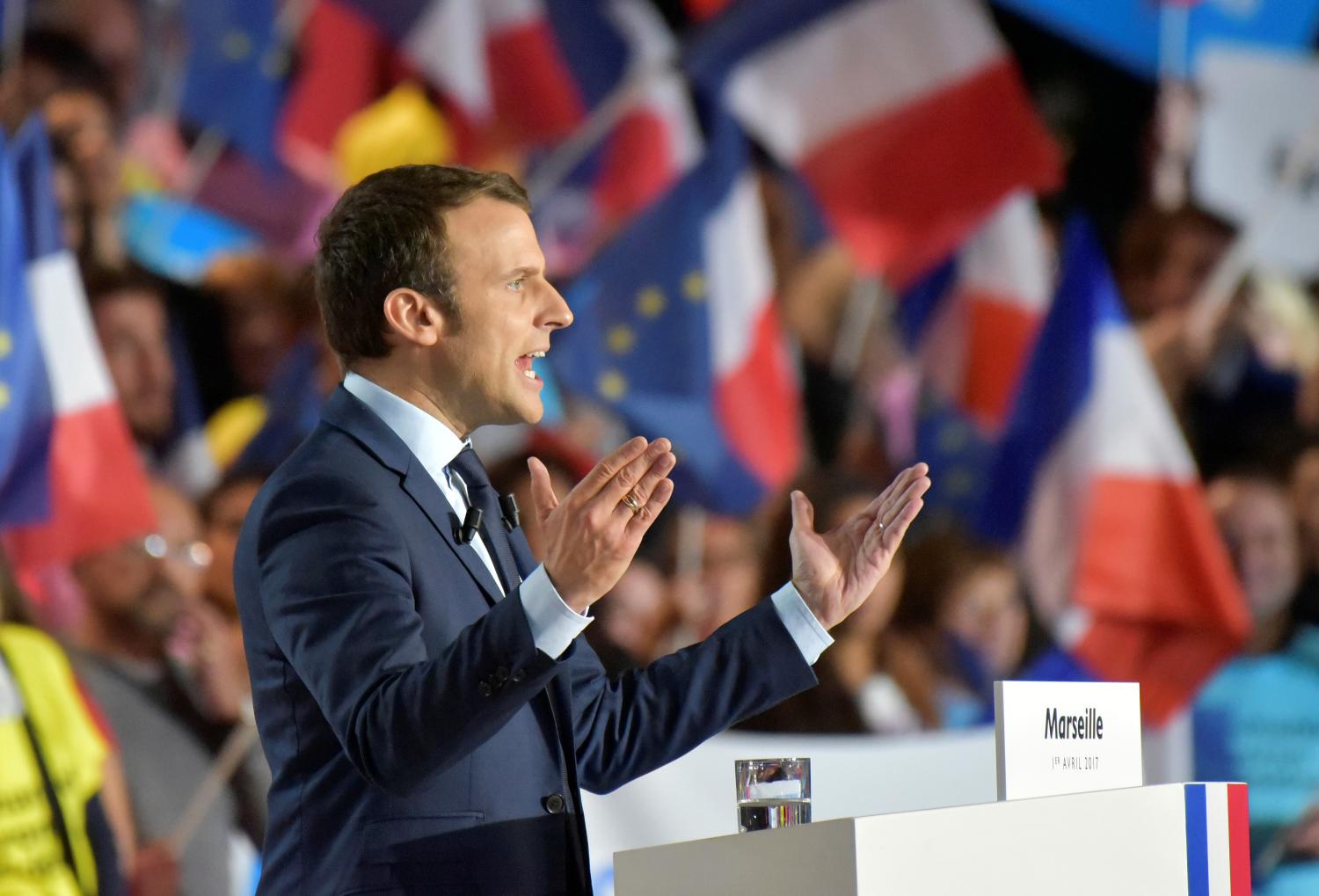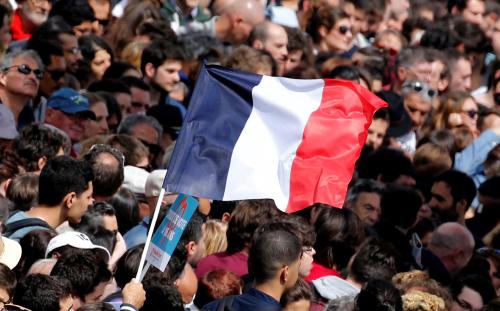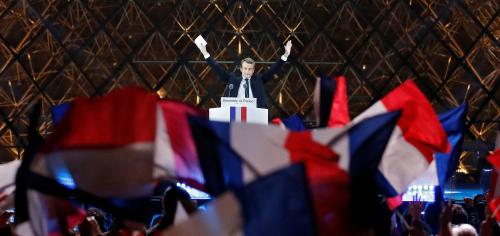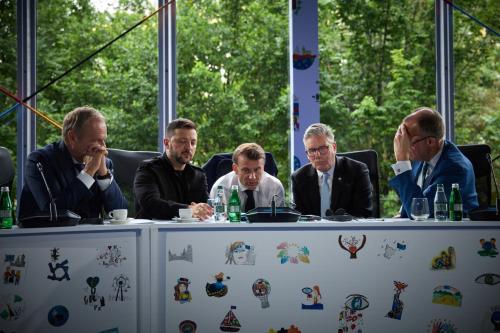What’s next on the docket for Emmanuel Macron, who—defying doomsayers and defeating his far-right opponent 2 votes to 1—became France’s next president on Sunday? By all accounts, his path was an exceptional one: He was virtually unknown to the general public three years ago, and his year-old party En Marche! now has close to 300,000 members. But he needs more than the presidency and more than a party base to implement the platform he promised; he needs a legislature he can work with.
The trouble is, France is deeply divided, and 43 percent of his electors say they voted against Le Pen rather than for Macron. On Sunday night in front of the Louvre Museum in Paris, Macron said: “Our task will be to build a real majority, a majority for change.” Will that be possible, particularly in Front National strongholds in northeastern and southeastern France where socioeconomic realities differ starkly from pro-Macron regions along the Atlantic coast? Speaking on Sunday night, he said of Le Pen’s voters: “I respect them, but I will do my utmost to prevent a vote for the extreme parties,” looking ahead to the parliamentary elections on June 11 (first round) and 18 (runoff).
So what is Macron facing in his first 50 or so days, up through the final parliamentary vote? Below are some of the steps he’ll need to undertake in the coming weeks in order to start implementing his platform.
- On May 14 at midnight, the mandate of outgoing president François Hollande will officially end. The following day, Macron will take over during a formal ceremony. Shortly after his inauguration, Macron will appoint a prime minister. According to the constitution, they, together, will appoint a new cabinet. It is expected that Macron’s cabinet will look like no other, with a combination of experienced politicians (both right and left) and members of civil society, the business sector, and grassroots organizations. Among the names that have been circulating are the center-right Mayor of Le Havre Edouard Philippe, outgoing defense minister Jean-Yves Le Drian, IMF Managing Director Christine Lagarde, Member of the European Parliament Sylvie Goulard, and current general secretary of En Marche! (one of masterminds of the election) Richard Ferrand.
- On May 25, Macron will meet other world leaders—including Donald Trump—at the NATO summit in Brussels. During the campaign, Macron clearly opposed any further NATO enlargement (besides perhaps Finland and Sweden). He also said he would ask for a limitation of NATO interventions “outside the organization’s traditional geographical zone” (i.e. Europe). This is a fairly Gaullist, pre-Nicolas Sarkozy (2007-2012) traditional view, in other words.
- On June 11 and June 18, the French people will vote again, this time for their 577 representatives to the National Assembly (lower house of parliament). This election is critical for Macron: Without a parliamentary majority for the renamed party La République en Marche!, he faces the prospect of “cohabitation,” or a coalition with one or more of the other political parties, which may tie his hands politically. According to a Le Monde exit poll, 61 percent of second-round Macron voters do not want him to win a parliamentary majority. Both the center-right Les Républicains (LR) and center-left Parti socialiste—who opposed him (and were defeated) in the election’s first round—are now planning to run against his candidates. The far-left movement La France Insoumise, whose candidate Jean-Luc Mélenchon was also defeated in the first round, will field fierce opponents. So will the Front National. The far-right party managed to attract one-third of the electorate last Sunday and will present candidates in every parliamentary constituency. It will most probably gain seats (coming from the very low base of just two members in the outgoing National Assembly), but not a significant number in the face of multi-candidate races, which are likely to lead to either pro-Macron, or socialist, or LR representatives winning. Le Pen will probably try to translate her 10 million votes into a new political force with a new name for the party sometime in 2018.
- Following the legislative elections, the president will appoint (or re-appoint) a prime minister and cabinet, depending on which party won the June elections. The cabinet will reflect the legislative election results. Macron has called for a reduced cabinet (15 ministers) with gender parity, as has been the case since 2012.
- Macron will have to start his pro-reform agenda, especially reducing fiscal burdens on companies, reforming labor laws, and starting to audit public finances. Unlike many of his predecessors, Macron is expected to focus on a domestic agenda rather than an international one—with Europe being the exception. During the campaign, Macron promised to make his first foreign trip to Germany, where Chancellor Angela Merkel has already expressed her satisfaction to be working with another pro-European (so did her coalition partner, leader of the Social Democratic Party and foreign minister Sigmar Gabriel). The French president-elect and the German leader will meet later this week. In his acceptance speech last Sunday, Macron referred to Europeans’ “common destiny,” which was music to the ears of EU leaders in Brussels. Discussions between France, Germany, Italy, and Spain to relaunch the eurozone started last march. Ahead of the Brexit negotiations, the four leaders at the time threw their weight behind a multi-speed Europe. Chances are running high that Emmanuel Macron will take the initiative to relaunch the eurozone in particular. Ahead of her country’s own tough general elections in September, Merkel will be keen to show a willingness to address France’s concern as it sees benefits in a stronger, more business-friendly neighbor. Germany will probably agree to a larger financial commitment within the EU (and more defense spending), but it is not clear whether Berlin will go along Macron’s proposal to have a specific eurozone budget run by a newly-created eurozone finance minister.
The Brookings Institution is committed to quality, independence, and impact.
We are supported by a diverse array of funders. In line with our values and policies, each Brookings publication represents the sole views of its author(s).








Commentary
Challenges awaiting Macron in his first 50 days
May 9, 2017